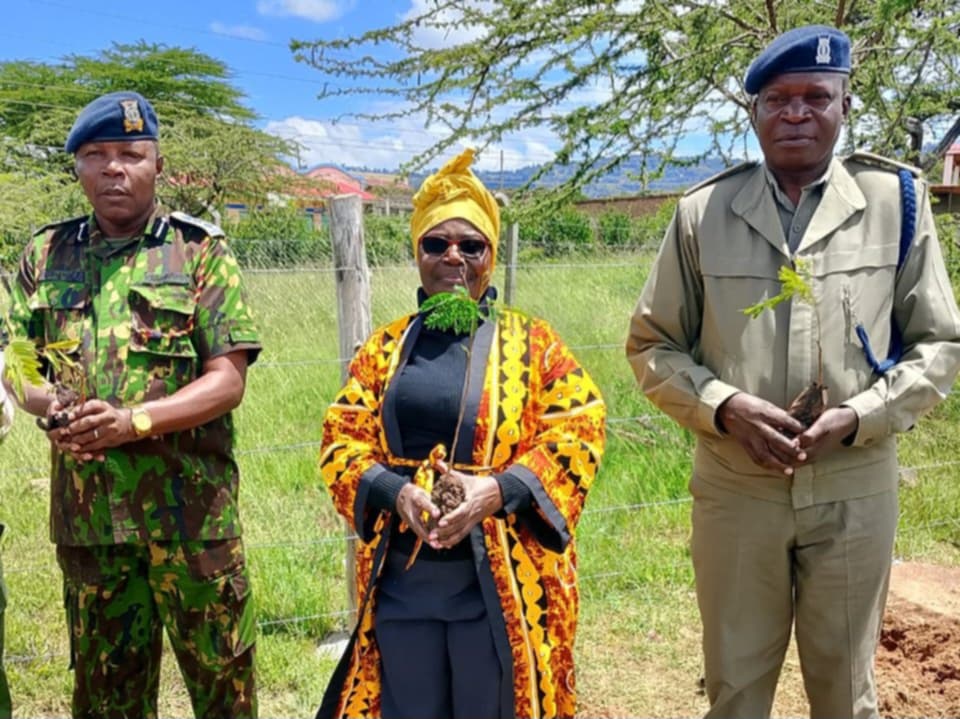

More than 1,000 trees were planted on Thursday during a public baraza in Machakos County.
Six hundred trees were planted at Katheka Kai Secondary School in Machakos Sub-county, while over 400 others were distributed to residents for planting at their homes.
Machakos Deputy County Commissioner David Rotich said the tree-planting exercise aligns with the government’s campaign to grow 15 billion trees by 2032.
“We planted 600 tree seedlings at the school and issued over 400 others to the public who participated in the exercise,” Rotich told The Star exclusively at Katheka Kai Secondary School shortly after the event.
Rotich said his office had organised the public baraza to engage residents on various issues previously raised in the area.
“We wanted to engage with the community through a public baraza. Since this is the rainy season, we decided to include tree planting to align with the government’s campaign of growing 15 billion trees by 2032,” he said.
The baraza was attended by members of the Machakos County and Sub-county Security and Intelligence Committees, who also participated in the tree-planting exercise.
Rotich encouraged the public to plant more trees, especially during the ongoing rainy season. He urged locals to embrace the planting of fruit trees as well, due to their value as both food and a source of livelihood.
He added that more trees should be planted in public spaces such as schools, vocational training institutions, colleges, and universities.
“Schools with space for planting trees should be turned into models for communities to learn from,” Rotich said.
He suggested that schools plant trees on learners’ birthdays, universities do so during charter ceremonies, and locals during anniversaries and weddings as a way to contribute to the 15 billion tree target.
He urged the public to visit the Kenya Forest Service in Machakos for free tree seedlings to plant on their farms.
Rotich also noted that there are farmers with private tree nurseries where locals can buy trees for planting on their private land.
He praised Katheka Kai Secondary School Principal Margaret Owaka for championing tree planting, not only within the school compound but in the community as well.
“The principal has done exceptionally well in greening the school. In fact, instead of planting flowers in the school compound, she has planted kales in sacks as ornamental plants—they are very beautiful,” Rotich said.
The kales are used to feed students, thereby reducing operational costs for the school’s Board of Management.
Rotich encouraged locals to follow this example, not just for nutritional value but also as a source of income.
Owaka said it was a great honour for the Security Committee to choose her school as the venue for the baraza and tree-planting event.
She educated the community on the importance of growing trees and vegetables.
Some students from the Katheka Kai area participated in the tree planting exercise, with each participant planting at least one tree.
Owaka, however, reiterated concerns about high levels of insecurity, illicit liquor, drug and substance abuse, and violations of bar operation laws and regulations.
“I urge area security personnel to intensify efforts in the Katheka Kai area. There is a lot of thuggery, and drugs—especially bhang—are widely available, with some even reaching our schools,” Owaka said.
She added that bars in the area were opening as early as 8:00 a.m., with some operators selling alcohol to children, including those in school uniforms.
Beyond security issues, the baraza addressed matters such as human–wildlife conflict, illicit alcohol, drug and substance abuse, SHA registration, and high levels of unemployment.
Residents reported an increased presence of cheetahs in the area, leading to more frequent human–wildlife conflicts.
Members of the security committees present responded to public concerns and promised the necessary interventions.
Locals were also educated on how to coexist with wildlife to avoid conflicts and were urged to report sightings to the relevant authorities for appropriate action.
Rotich said the government would address all the raised concerns and encouraged the public to share intelligence information with relevant authorities, including himself.
He warned individuals involved in criminal activities to reform or face consequences.
The administrator also urged residents to register with SHA and encouraged youth to embrace entrepreneurship instead of relying solely on white-collar jobs.
“Every year, we release 70,000 graduates into the job market. With the education you’ve acquired, use technology and available resources to earn a livelihood,” Rotich said.




![[PHOTOS] Salasya launches countrywide tour](/_next/image?url=https%3A%2F%2Fcdn.radioafrica.digital%2Fimage%2F2025%2F05%2F6130a5ee-f7bb-4571-a62e-3601b8697f34.jpeg&w=3840&q=100)



